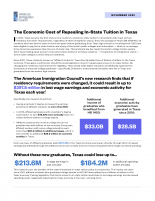- Fact Sheet
The Economic Cost of Repealing In-State Tuition in Texas
Published
New research from the American Immigration Council highlights the harmful economic effects of increasing public college and university tuition for certain long-term Texas resident students. In 2001, Texas became the first state in the country to extend in-state tuition to all students who meet certain residency and other requirements, regardless of their immigration status. Since the passage of House Bill (HB) 1403, all students who have lived in-state in the three years before graduating from Texas high schools or receiving their GED, known as affidavit students, have been eligible to pay the in-state tuition rate at any of the state’s public colleges and universities—which is, on average, three times less expensive than the out-of-state rate. This landmark law has made the state’s college tuition system fairer by providing equal access to the same tuition levels for all Texas students—irrespective of immigration status—at the state colleges to which they are admitted.
The new research finds that efforts to create a new category of Texas residents who are charged out-of-state tuition would not only increase hardship on the affected students but could also harm the Texas economy.
Specifically, the new research finds that:
-
Texas stands to lose more than $461 million every year if residency requirements are changed. Repealing the state’s long-standing in-state tuition policy could result in $244.4 million in lost wage earnings and $216.9 million in lost additional spending power annually.
-
Having a bachelor’s degree increases the earning potential of affidavit students by more than 57%. In 2019, affidavit graduates with a bachelor’s degree could expect to earn nearly $19,600 more annually than non-citizen workers without a college degree.
-
Affidavit students who enroll in college but do not graduate also add millions to the economy. Affidavit workers with some college education earn more than $52.3 million in additional wages, which in turn creates an additional $46.4 million in economic activity in Texas every year.
Help us fight for immigration justice!
The research is clear – immigrants are more likely to win their cases with a lawyer by their side. But very few can get attorneys.
Introducing the Immigration Justice Campaign Access Fund.
Your support sends attorneys, provides interpreters, and delivers justice.

Immigration Justice Campaign is an initiative of American Immigration Council and American Immigration Lawyers Association. The mission is to increase free legal services for immigrants navigating our complicated immigration system and leverage the voices and experiences of those most directly impacted by our country’s immigration policies to inform legal and advocacy strategies. We bring together a broad network of volunteers who provide legal assistance and advocate for due process for immigrants with a humane approach that includes universal legal representation and other community-based support for individuals during their immigration cases.

